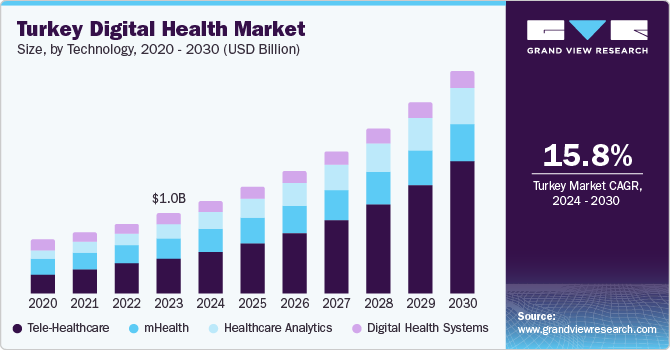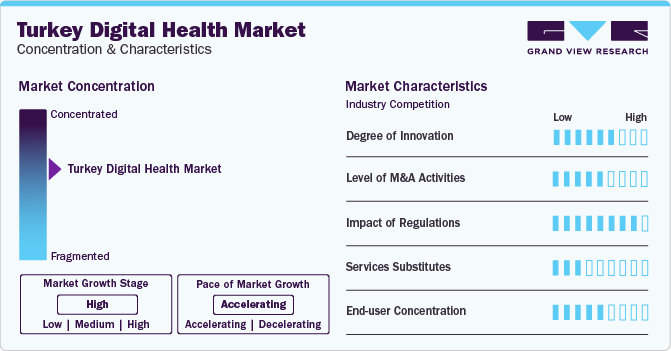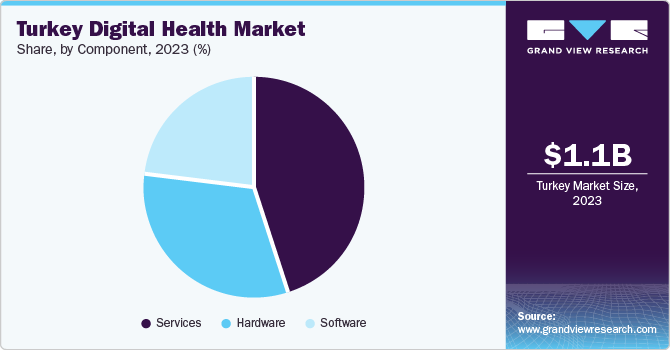- Home
- »
- Healthcare IT
- »
-
Turkey Digital Health Market Size And Share, Report, 2023GVR Report cover
![Turkey Digital Health Market Size, Share & Trends Report]()
Turkey Digital Health Market Size, Share & Trends Analysis Report By Technology (Tele-Healthcare, Healthcare Analytics), By Component (Services, Software), By Application (Diabetes), By End-use, And Segment Forecasts, 2024 - 2030
- Report ID: GVR-4-68040-198-5
- Number of Report Pages: 90
- Format: PDF, Horizon Databook
- Historical Range: 2018 - 2022
- Forecast Period: 2024 - 2030
- Industry: Healthcare
Market Size & Trends
The Turkey digital health market size was valued at USD 1.10 billion in 2023 and is projected to grow at a compound annual growth rate (CAGR) of 15.8% from 2024 to 2030. The rising adoption of digital health solutions, accessibility of virtual care, advancements in healthcare IT infrastructure, growing prevalence of chronic disease, and high demand for remote patient monitoring services are some of the factors driving the market growth. Moreover, the increasing demand for cost-effective solutions and rising healthcare expenses is further contributing to the market growth.

The Turkey digital health market was significantly impacted by the COVID-19 pandemic in 2020 however, it recovered in 2021 with the improved accessibility of healthcare services and advancements in the country infrastructure. According to the Johns Hopkins Coronavirus Resource Center, Turkey was among the top 10 countries with the highest and contagious COVID-19 cases globally. The availability of technologies, timely analysis, and input of national data helped Turkey with evidence-based epidemic response practices to effectively control COVID-19. This pandemic accelerated the development of digital health technologies by helping formulate strategies, particularly in disease observation and frontline care services, which fueled the market growth.
In October 2020, a visual examination appointment service and telehealth integration guide were introduced by the MoH in Turkey for COVID-19 patients within a "Risk Group." This system allowed patients to be examined via MHRS, the central physician appointment system, without visiting a public health institution to schedule a physical appointment. These public facilities were equipped with video examination capabilities that allowed doctors to assess, diagnose, and provide appropriate electronic prescriptions to patients. Moreover, telehealth and telemedicine enhance access by improving time management for patients and doctors and help reduce costs by reaching a broader patient base.
Turkey’s largest healthcare service provider, the Ministry of Health (MoH) is responsible for planning, formulating and implementing healthcare policies in the country. With a population of over 86 million, MoH manages the citizen’s healthcare information through an Electronic Health Record (EHR) which is centrally stored on MoH servers. The system generates e-prescriptions and enables pharmacies to claim receivables online. The MoH uses this data to forecast and analyze illness patterns and has implemented initiatives to reduce diagnostic errors, assess public hospitals, and support telemedicine. They have implemented telemedicine, telehealth, and remote monitoring services to facilitate in-person contacts between doctors and patients. As a result, the adoption of a shift towards remote healthcare in Turkey is anticipated to boost the digital health market.
The Internet of Things (IoT) is revolutionizing the digital healthcare sector by assisting activities like chronic disease management, drug prescription optimization, staff tracking and equipment availability. The surge in the use of wearable devices such as fitness trackers and smartwatches for monitoring health metrics remotely enables healthcare professionals to offer personalized care. Advanced wearable devices and integrated analytics are transforming the market where big data implementation plays a significant role in empowering tailored digital experiences and optimizing resources and time to provide better services.
The MoH developed a bilingual electronic health information system called e-Nabız also callede-Pulse, which collects hospital records, including imaging-based services, in a central database and shares them with doctors and patients. This system offers a platform where patients can access their data and schedule their appointments with physicians in public institutes. According to the National Institute of Health, e-Nabız has been adopted by 82% of the population in Turkey, and around 220 million users are queried by physicians to reach patients’ labs.
Market Concentration & Characteristics
The market growth stage is high, and the market pace is accelerating. The Turkish digital health market is characterized by high innovation, with new techniques and technologies constantly being created and released. The players in the market concentrate on creating telehealth solutions that are more user-friendly and intuitive, thereby reducing the learning and adoption hurdles for both patients and practitioners.

The digital health sector in Turkey is also distinguished by a large volume of technology companies and healthcare providers partnering and engaging in mergers and acquisitions (M&A) with the goal of improving the caliber and accessibility of healthcare services via digital channels.
Digital technologies are subject to diverse regulatory frameworks across Turkey. The structured regulatory framework positively impacts market access, growth, and compliance. For instance,
The Ministry of Health in Turkey published a Regulation on the Provision of Remote Healthcare Services in February 2022. The regulation stipulates that only certain healthcare institutions and services can provide remote operations permit, including examination, consultation, clinical parameter evaluation, interventional and surgical operations, e-prescription issuance, and health data tracking through wearable technologies. Non-compliance may result in service termination or withdrawal of operation permit.
Digital health in Turkey is a complex system with limited direct product substitutes. The Ministry of Health centrally stores patient's data in its servers and offers flexibility in telehealth services. However, some technologies, such as telemedicine platforms, wearable devices, and fitness-focused mobile applications, can achieve greater outcomes.
The distribution of digital health solutions varies in Turkey based on factors such as technology access, healthcare infrastructure, regulatory policies, and cultural preferences. The market is influenced by end-user concentration, with a few industries driving demand for fitness platforms. This concentration offers opportunities for companies developing digital health applications but also presents challenges for companies competing in a crowded market.
Technology Insights
The tele-healthcare segment dominated the market with a revenue share of 43.2% in 2023 and is also expected to register the fastest CAGR over the forecast period owing to the factors such as improving internet connectivity, an increase in the number of smartphones in use, advanced technological readiness, a growing scarcity of healthcare providers, rising medical costs, and the ease of access to telehealth applications. The COVID-19 pandemic has encouraged this trend by emphasizing the value of remote healthcare services.
Rapid technology breakthroughs and the rising incidence rate of chronic disorders, including diabetes and cardiovascular diseases, are driving the popularity of remote patient monitoring services. The demand for is expected to increase throughout the forecast period due to the estimated growth of the geriatric population worldwide. The key drivers of the segment growth include increasing healthcare IT expenditure, supportive government regulations, and legislation encouraging healthcare digitization.
The mHealth segment is the second largest segment based on technology owing to the rising adoption of mHealth apps by healthcare service providers to improve the quality of care through real-time patient engagement, which is also assisting the market growth. For instance, the Hera Digital Health Mobile App aims to establish a mobile health platform that connects refugee populations with global healthcare, with the first step being to boost prenatal care and childhood vaccination rates among Syrian refugees in Turkey.
Component Insights
The services segment accounted for the largest market revenue share in 2023, pertaining to the increasing demand for remote patient care, advanced software solutions such as electronic medical records (EMRs), and other services such as virtual training, installation, and maintenance. The demand for remote patient monitoring services, strengthening healthcare systems, and chronic disease management & post-acute care services is expected to drive the market growth.

The software segment is expected to register the fastest CAGR over the forecast period owing to the increased adoption of digital healthcare platforms amongst healthcare providers and patients. The growing number of developers offering application update services and the need for software platforms with enhanced functionality are expected to result in an increased demand for digital health solutions. The demand for personalized medicine and value-based care is driving segment growth, where healthcare facilities are adopting advanced software solutions to improve clinical operations, streamline workflows, and improve financial outcomes.
Application Insights
The diabetes segment dominated the market with the largest share in 2023 and is expected to register the fastest growth from 2024 to 2030. The prevalence of diabetes and its associated complications has positioned it as the largest segment in the digital health space in Turkey. Innovative approaches and solutions, such as smartphone applications and wearable devices, empower patients to participate actively in diabetes management. These technologies facilitate remote patient monitoring, allowing providers to receive timely data, make informed decisions, and offer timely interventions, ultimately contributing to more effective diabetes management.
The increasing prevalence of diabetes has led to a surge in demand for preventive strategies and early intervention methods. Digital health solutions provide personalized, data-driven insights, empowering individuals to modify their lifestyles and manage risk factors effectively. The diabetes segment continues to expand, driven by the need for accessible, efficient, and patient-centric solutions. Obesity was the second-largest segment in 2023, driven by high global prevalence and the need for effective weight management solutions by offering personalized interventions, including mobile applications and wearable devices.
End Use Insights
The patients segment held the largest share in 2023 and is expected to witness the fastest CAGR from 2024 to 2030, owing to the shift toward patient-focused care and greater comprehension of health management. Technology has completely changed the industry by offering patients the means to control their treatment, access health records, and engage in remote monitoring. The focus on the patient segment reflects the industry's commitment to improving patient engagement, promoting proactive health management, and fostering an enhanced collaborative and informed experience.
In addition, the growth of the provider segment was driven by the widespread adoption of cutting-edge technology like digital therapies and telemedicine. These solutions save in-person visits and enhance patient results by enabling evidence-based therapy, individualized treatment plans, and remote consultations. Turkey's wearable technology and health applications market is expanding, and more hospitals are utilizing electronic data.
Key Turkey Digital Health Company Insights
Some of the key players operating in the market include Samsung; Microsoft; IBM Corporation, GE Healthcare
-
Samsung Electronics offers customizable, flexible devices for remote care, including wearables and partner apps for patient health and rehabilitation monitoring. The company also provides Samsung Knox, a defense-grade security platform, to protect medical data and patient information, and secure WiFi network encryption for off-site or distance care.
-
IBM Corporation provides secure platform experiences for data and artificial intelligence needs, offering advanced healthcare technology solutions, digital transformation services, and scalable implementation with IBM Cloud, IBM Consulting, IBM FlashSystem, and IBM Security.
Epic System Corporation, Philips, and Medtronic are some of the other market participants in the Turkey digital health market.
Key Turkey Digital Health Companies:
The following are the leading companies in the Turkey digital health market. These companies collectively hold the largest market share and dictate industry trends. Financials, strategy maps & products of these Turkey digital health companies are analyzed to map the supply network.
- Samsung
- Epic Systems Corporation
- Medtronic
- IBM Corporation
- Microsoft Corporation
- Oracle Cerner
- Philips
- Qualcomm Technologies, Inc.
- GE Healthcare
- Apple Inc.
Recent Developments
-
In February 2021, Turkey's CUREA team collaborated with GE Healthcare's Edison Health Services to develop AI-based COVID-19 and breast cancer applications, aiming to accelerate AI ecosystem in Turkey's software development through healthcare digitalization.
Turkey Digital Health Market Report Scope
Report Attribute
Details
Market size value in 2024
USD 1.26 billion
Revenue forecast in 2030
USD 3.05 billion
Growth rate
CAGR of 15.8% from 2024 to 2030
Base year for estimation
2023
Historical data
2018 - 2022
Forecast period
2024 - 2030
Quantitative units
Revenue in USD million/billion and CAGR from 2024 to 2030
Report coverage
Revenue forecast, company ranking, competitive landscape, growth factors, and trends
Segments covered
Technology, component, application, end use
Key companies profiled
Samsung; Epic Systems Corporation; Medtronic; IBM Corporation; Microsoft Corporation; Oracle Cerner; Philips; Qualcomm Technologies, Inc.; GE Healthcare; Apple Inc.
Customization scope
Free report customization (equivalent up to 8 analysts working days) with purchase. Addition or alteration to country, regional & segment scope.
Pricing and purchase options
Avail customized purchase options to meet your exact research needs. Explore purchase options
Turkey Digital Health Market Report Segmentation
This report forecasts revenue growth at the country level and provides an analysis of the latest industry trends in each of the sub-segments from 2018 to 2030. For this study, Grand View Research has segmented the Turkey digital health market report based on technology, component, application, and end use:
-
Technology Outlook (Revenue, USD Billion, 2018 - 2030)
-
Tele-Healthcare
-
Tele-care
-
Activity monitoring
-
Remote medication management
-
-
Tele-health
-
LTC monitoring
-
Video consultation
-
-
-
mHealth
-
Wearables
-
BP Monitors
-
Glucose Meters
-
Pulse Oximeters
-
Sleep Apnea Monitors
-
Neurological Monitors
-
Activity Trackers/Actigraphs
-
-
mHealth Apps
-
Medical Apps
-
Fitness Apps
-
-
Services
-
mHealth Service, By Type
-
Monitoring Services
-
Independent Aging Solutions
-
Chronic Disease Management & Post-Acute Care Services
-
-
Diagnosis Services
-
Healthcare Systems Strengthening Services
-
Others
-
-
mHealth Services, By Participants
-
Mobile Operators
-
Device Vendors
-
Content Players
-
Healthcare Providers
-
-
-
-
Healthcare Analytics
-
Digital Health Systems
-
EHR
-
E-prescribing systems
-
-
-
Component Outlook (Revenue, USD Billion, 2018 - 2030)
-
Hardware
-
Software
-
Services
-
-
Application Outlook (Revenue, USD Billion, 2018 - 2030)
-
Obesity
-
Diabetes
-
Cardiovascular
-
Respiratory Diseases
-
Others
-
-
End Use Outlook (Revenue, USD Billion, 2018 - 2030)
-
Patients
-
Providers
-
Players
-
Others
-
Share this report with your colleague or friend.
![gvr icn]()
NEED A CUSTOM REPORT?
We can customize every report - free of charge - including purchasing stand-alone sections or country-level reports, as well as offer affordable discounts for start-ups & universities. Contact us now
![Certified Icon]()
We are GDPR and CCPA compliant! Your transaction & personal information is safe and secure. For more details, please read our privacy policy.
We are committed towards customer satisfaction, and quality service.
"The quality of research they have done for us has been excellent."





